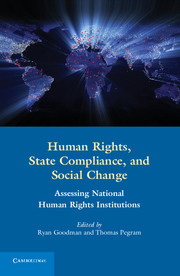Book contents
- Frontmatter
- Contents
- Contributors
- Preface
- 1 Introduction
- PART I NHRIs in Theory and Reality
- PART II NHRI Performance
- 5 National Human Rights Institutions and the International Human Rights System
- 6 National Human Rights Institutions in Anglophone Africa
- 7 National Human Rights Institutions in the Asia Pacific Region
- 8 National Human Rights Institutions in Central and Eastern Europe
- 9 National Human Rights Institutions in Latin America
- PART III NHRIs and Compliance
- PART IV Final Reflections
- Annex 1
- Index
- References
8 - National Human Rights Institutions in Central and Eastern Europe
The Ombudsman as Agent of International Law
from PART II - NHRI Performance
Published online by Cambridge University Press: 05 June 2012
- Frontmatter
- Contents
- Contributors
- Preface
- 1 Introduction
- PART I NHRIs in Theory and Reality
- PART II NHRI Performance
- 5 National Human Rights Institutions and the International Human Rights System
- 6 National Human Rights Institutions in Anglophone Africa
- 7 National Human Rights Institutions in the Asia Pacific Region
- 8 National Human Rights Institutions in Central and Eastern Europe
- 9 National Human Rights Institutions in Latin America
- PART III NHRIs and Compliance
- PART IV Final Reflections
- Annex 1
- Index
- References
Summary
Introduction
The sudden proliferation of national human rights institutions in the Eastern European transition from Communism went largely unremarked at the time. Two decades later, when NHRIs are a more frequent object of study, it is not just the number of NHRIs in the region that is noteworthy but the general uniformity of their structure and function. In the former communist states of Eastern Europe and the Soviet Union – 28 in all – only three have yet to establish an NHRI: Belarus, Tajikistan, and Turkmenistan.
Some political scientists have understandably sought to classify the ombudsman institutions depending on the thoroughness of the democratic transition. The approach taken in this chapter is somewhat different, however. The creation of these institutions coincided with a significant and deliberate turn by the East European states to embrace international legal norms, especially in the field of human rights. The ombudsman institutions have as a principal function the investigation of individual complaints from members of the public. Has it been possible for them to embrace standards of international law, which presupposes a broad and systemic approach to human rights, at the same time as providing a remedy for individual grievances?
- Type
- Chapter
- Information
- Human Rights, State Compliance, and Social ChangeAssessing National Human Rights Institutions, pp. 181 - 209Publisher: Cambridge University PressPrint publication year: 2011
References
- 1
- Cited by



